Cathay Pacific has been struggling financially lately, as they face increased competition from both Gulf carriers and low cost carriers. This has brought their yields way down. The fact that they have pretty sparsely configured planes doesn’t help either (though that’s soon changing).
Just how bad are things? Cathay Pacific today revealed their results for the first half of 2017, and they’re significantly worse than expected. Per the South China Morning Post, Cathay Pacific reported a 2.05 billion HKD loss for the first half of the year (262 million USD), compared to a profit of 353 million HKD during the same period last year (45 million USD).
The airline had forecast a loss of 1.2 billion HKD for the period, though they even performed significantly worse than that. This is the company’s first time having a loss in the first half of the year since 2012, and as a result, the airline won’t be paying any dividends to shareholders.
While total revenue is up marginally, their costs are up significantly, and their yields (the amount passengers pay per flown mile) are down by 5.2% compared to the same period last year. Cathay Pacific’s chairman (who just got the job as of May 2017), is expecting that the second half of the year won’t be much better, meaning that the airline will see losses for two years in a row for the first time ever (in 2016 they lost 575 million HKD, or 73 million USD).
Here’s what Cathay Pacific’s chairman, John Slosar, said about the prospects for the airline:
“We do not expect the operating environment in the second half of 2017 to improve materially. In particular, the passenger business will continue to be affected by strong competition from other airlines and our results are expected to be adversely affected by higher fuel prices and our fuel hedging positions. However, the outlook for the cargo business is good and we expect robust demand and growth in cargo capacity, yield and load factor in the second half of this year. We expect to see the benefits of our transformation in the second half of 2017, and the effects will accelerate in 2018.
“We are addressing the industry challenges through our corporate transformation and by expanding our route network, increasing frequencies on our most popular routes and buying more fuel-efficient aircraft. This will help us to increase productivity and to reduce costs while improving the quality of our services to customers. We continue to enhance our high standards of customer service and are proud of the quality, dedication and professionalism of our staff.
“The new management team is acting decisively to make Cathay Pacific and Cathay Dragon better airlines and stronger businesses, delivering more to customers with improved productivity. We are confident that we are on the right track to achieve strong and sustainable long-term performance, with a leaner, more competitive business, while enhancing the brand and the quality of services that our customers deserve and expect. These services are always delivered by our people, who remain dedicated in these volatile times. I would like to thank them for their hard work and commitment.
In addition to decreased yields, the airline largely attributes their losses to increased fuel costs:
Total fuel costs for Cathay Pacific and Cathay Dragon (before the effect of fuel hedging) increased by HK$2,871 million (or 33.4%) compared with the first half of 2016, reflecting a 31.5% increase in average fuel prices and a 1.6% increase in consumption. Fuel is the Group’s most significant cost, accounting for 30.4% of total operating costs in the first half of 2017 (compared to 29.1% in the same period in 2016). Fuel hedging losses were reduced. After taking them into account, fuel costs increased by HK$1,678 million (or 12.7%) compared with the first half of 2016.
There was a 2.8% increase in non-fuel costs per available tonne kilometre. Excluding fuel and one-off items, the increase was 0.5%. Cost savings offset higher aircraft maintenance, depreciation and finance costs.
There are a few other things they blame for the losses:
Several special factors affected the results in the first half of 2017. In March, the European Commission issued a decision finding that a number of international air cargo carriers, including Cathay Pacific, had agreed to cargo surcharge levels prior to 2007 and that such agreements infringed European competition law and imposed a fine of Euros 57.12 million (equivalent to approximately HK$498 million) on Cathay Pacific. Although an application has been made to the General Court of the European Union to annul the decision which led to the fine, the full amount of the fine has been recognised.
In March, Air China announced the completion of the issue of 1.44 billion A shares. As a result, Cathay Pacific’s shareholding in Air China was diluted from 20.13% to 18.13% and a gain of HK$244 million was recognised on the deemed partial disposal. In April, Cathay Pacific disposed of its entire interest in Travelsky Technology Limited at a profit of HK$586 million. In the first half of 2017, Cathay Pacific commenced a three-year corporate transformation programme intended to address the fundamental challenges that it is facing in the current airline industry environment. In May, as part of this programme, we announced a reorganisation of our head office. The amount of the associated redundancy costs (HK$224 million) has been recognised in staff expenses.
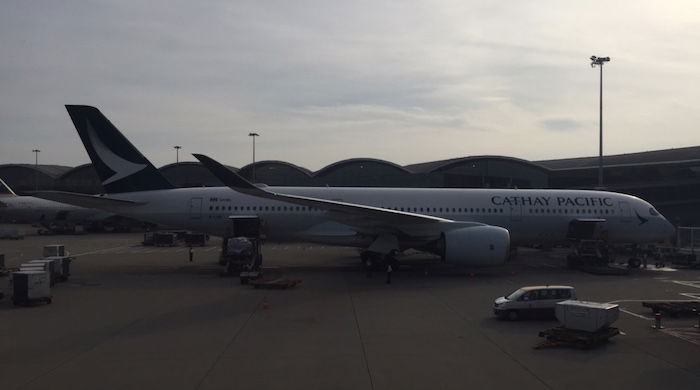
Bottom line
While Cathay Pacific is cutting some jobs and making fairly minor changes, I suspect we’ll soon see a more radical transformation, because it’s clear their current strategy isn’t working very well. While I don’t think they’ll go as far as Malaysia Airlines has in transforming, clearly there’s a lot more work to be done on the road to profitability.
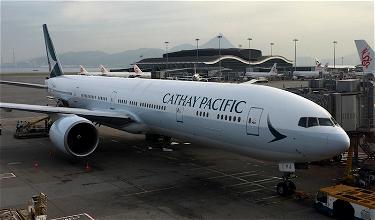

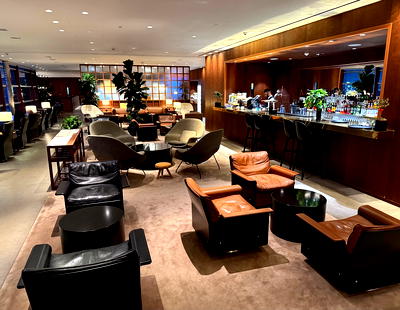
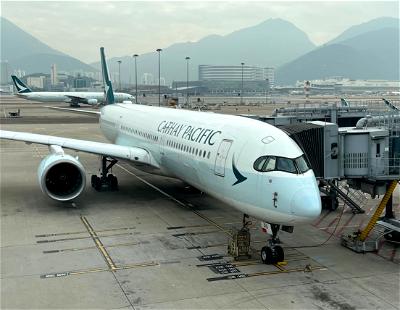
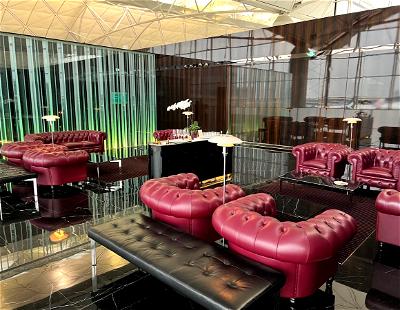
Cry me a river. Perhaps they shouldn't charge $600 one way for Chiang Mai to Hong Kong.
With respect to Dr Robinson comments, to understand CX have view the lens of the parent company history. Swire been trading in China for the last 250 years, they survived the boxer revolution , Kai Tak densitys, WW2 Japanese occupation , Mao's communist China to the present China. Swire along with Jardine from Scotland where the second European traders after Marco Polo. So they know how to play the geopolitical game, they wrote the book...
With respect to Dr Robinson comments, to understand CX have view the lens of the parent company history. Swire been trading in China for the last 250 years, they survived the boxer revolution , Kai Tak densitys, WW2 Japanese occupation , Mao's communist China to the present China. Swire along with Jardine from Scotland where the second European traders after Marco Polo. So they know how to play the geopolitical game, they wrote the book how to do business in Indo China. There be no selling out to any Chinese carrier while. Sir Adrian is still alive. The best scernio CX returns to profit with equipment asset rationalization or shrink back to the 1970's position where served intra Asia and Australia. What Swire focus on is the asset debit ratio, this a company that detest high debit.Sir Adrian vision of a airline is for elite travelers they never want backpackers or Cheap shakers, don't expect ever to see low fares comparable to other carriers.
How is adding more seats in economy going to help CX? Customers are already abandoning the carrier in droves, making the seat space tighter is just going to push them out faster. Maybe they should going the other direction and install a 2-3-2 configuration. Now that would be a competitive advantage.
Further to comments from O'Reilly and ADP, I believe Sir Adrian will lose interest soon and sell out to a Chinese airline who will happily take the landing spots on offer and won't maintain the same brand positioning. HK will soon be a second rate Chinese city and it will all be a sad but faint memory.
Yes, I too used to fly CX loyally in the '00s between the States and southeast Asia. But a combination of product/schedule degradations (including cabin furnishing fiascos in both Coach and Business) coupled with substantial fare increases changed the equation. Add to that a mileage program with difficult redemptions and a show-stopping hard expiration of miles, and at some point I was simply done with them. Now, I'd only fly them opportunistically based on unique...
Yes, I too used to fly CX loyally in the '00s between the States and southeast Asia. But a combination of product/schedule degradations (including cabin furnishing fiascos in both Coach and Business) coupled with substantial fare increases changed the equation. Add to that a mileage program with difficult redemptions and a show-stopping hard expiration of miles, and at some point I was simply done with them. Now, I'd only fly them opportunistically based on unique schedules or as part of a deeply discounted consolidator fare involving other airlines. Better to either have a direct flight with a Stateside carrier, or a midway stopover with a crew that is genuinely respectful at virtually every turn, such as on ANA or EVA Air.
Well duh- Cathay Pacific cost WAY more than competitors for their biz tickets its ridic
too many options for travelers now in HK - especially when travelling long haul - ME3 airlines are 40-50% cheaper when flying biz to Europe so if you don't mind a break in your flight, then why not take it. HKexpress now flying to premium locations that CX dominated in the past and charging 40-50% less depending where you sit. CX use to be a transit hub for overseas mainlanders returning home but now this...
too many options for travelers now in HK - especially when travelling long haul - ME3 airlines are 40-50% cheaper when flying biz to Europe so if you don't mind a break in your flight, then why not take it. HKexpress now flying to premium locations that CX dominated in the past and charging 40-50% less depending where you sit. CX use to be a transit hub for overseas mainlanders returning home but now this is not the case as Chinese airlines are expanding internationally.
I think they have their pricing outdated - and failed to embrace market changes - like an ostrich with its head stuck in the sand
This issue is also exacerbated by mainland Chinese political activity. They are radically ramping up access to the wider world, so there is no longer the need to funnel that access through Hong Kong, hence the decline in activity for carriers like CX. Also the political activism of Hong Kongers who are advocating separatism isn't going to be tolerated well, so many suspect the mainland will subtly affect the economical viability of businesses that are...
This issue is also exacerbated by mainland Chinese political activity. They are radically ramping up access to the wider world, so there is no longer the need to funnel that access through Hong Kong, hence the decline in activity for carriers like CX. Also the political activism of Hong Kongers who are advocating separatism isn't going to be tolerated well, so many suspect the mainland will subtly affect the economical viability of businesses that are seen as proudly Hong Kong flag wavers.
I disagree with all the commenters here insisting this is mainly down to new direct routes by the Mainland Chinese carriers. The figures don't bear that out at all:
Mainland Chinese traffic is low yield still. CX load factors are up but yields falling so they are not losing low-yield transit passengers.
Leaving aside the fuel hedges, what's actually happened is CX have priced themselves out of their home and regional feeder market for some...
I disagree with all the commenters here insisting this is mainly down to new direct routes by the Mainland Chinese carriers. The figures don't bear that out at all:
Mainland Chinese traffic is low yield still. CX load factors are up but yields falling so they are not losing low-yield transit passengers.
Leaving aside the fuel hedges, what's actually happened is CX have priced themselves out of their home and regional feeder market for some time now, especially for mid-range business and high-end leisure passengers (the type of tourists who pay for business class seats on their holidays for example). Ex Hong Kong, CX routinely charges nearly double the price in business of their Oneworld competitors including both QR to Europe and AA to the States, and they no longer have a significantly better (or even as good of a) product on board.
At the same time when they introduced big changes to the Marco Polo Club last year they essentially punished mid-tier elites the most, and indeed elite status holders with CX fell by ~11pct overall. This is obviously not helping - it seems all they have done is replaced those mid-tier elite loyal fliers with low-yield tourists.
All you put up interesting theories about CX woes. The loss is about the lack of leadership from the parent company, Swire. CX what you seen in the last 20 years is the vision of Sir Adrian Swire, now Sir Adrian retired his two sons Merlin and Sam are completely incompenant. The future of the airline been turned to Sir Adrian 's newphew , Barney , on Sir Adrian's orders. He is smart and committed...
All you put up interesting theories about CX woes. The loss is about the lack of leadership from the parent company, Swire. CX what you seen in the last 20 years is the vision of Sir Adrian Swire, now Sir Adrian retired his two sons Merlin and Sam are completely incompenant. The future of the airline been turned to Sir Adrian 's newphew , Barney , on Sir Adrian's orders. He is smart and committed to Sir Adrian's airline. The problems faced by CX is half of the family making Sir Adrian is furious about it. Swire is not a public company operates serectively, not for industry or public eyes. I know cos I worked for the company know of the in and outs.
@Will, I think you set your expectations too high.
The CX today is not the CX 10 years ago.
I feel bad for the crew who are still doing their best in a terribly managed airline.
there is much more than meets the eye in this "loss". does anyone still try to find out what are the actual reasons for the reported "loss" and not read the screaming headline looking for a reader?
here's a good direction to look at - more fuel hedging losses, fines by eu on cargo price manipulation, and then the lower fares.
if cx hasn't shot themselves in the foot with their ignorance on...
there is much more than meets the eye in this "loss". does anyone still try to find out what are the actual reasons for the reported "loss" and not read the screaming headline looking for a reader?
here's a good direction to look at - more fuel hedging losses, fines by eu on cargo price manipulation, and then the lower fares.
if cx hasn't shot themselves in the foot with their ignorance on fuel hedging, they won't be reporting these "losses" that the media so loves to hype up.
anyone keeping count on how much cx has lost on their fuel hedging activities in the last 3 years? might want to do that......
I wonder to what extent their yield is down due to changes to marco polo. They didn't used to give elite credit for the lowest economy fares, so most corporate policies allowed employees to book into a more expensive Y fare. (Something akin to what the US3 are trying with basic economy)
Also, with their noticeable decline in food quality, it really would be a tough decision between AA and CX. While service is substantially...
I wonder to what extent their yield is down due to changes to marco polo. They didn't used to give elite credit for the lowest economy fares, so most corporate policies allowed employees to book into a more expensive Y fare. (Something akin to what the US3 are trying with basic economy)
Also, with their noticeable decline in food quality, it really would be a tough decision between AA and CX. While service is substantially more consistent on CX, wifi, PJs, and the mattress pad are very much in AA's favor.
@Lucky - John Slosar is the Chairman, not CEO, might want to correct that
I appreciate the more industry-focused article, thanks.
Both CX and SQ benefited enormously from having hubs in gateway cities to their respective regions, of which that competitive advantage is disappearing - could the 787 and A350 be partially responsible for this by enabling "long and thin" routes that bypass HKG?
I wonder what will happen to CX if/when Hong Kong is fully integrated into mainland China?
I typically fly from the US to BOM, and...
I appreciate the more industry-focused article, thanks.
Both CX and SQ benefited enormously from having hubs in gateway cities to their respective regions, of which that competitive advantage is disappearing - could the 787 and A350 be partially responsible for this by enabling "long and thin" routes that bypass HKG?
I wonder what will happen to CX if/when Hong Kong is fully integrated into mainland China?
I typically fly from the US to BOM, and sometimes I take the TPAC route for a change of pace - when I do, it's most often on CX.
@ Emirates4Ever
Oh, and how exactly do you know what the gulf carriers profit was? Because they told you? Ever hear of GAAP and why it is required by investors in financial markets? So companies can't just say whatever they want to and pay someone to swear to it.
https://www.forbes.com/sites/tedreed/2015/06/20/etihad-and-qatar-airways-report-earnings-so-to-speak-but-are-they-for-real/#5054db0476a1
@Paul @ Emirate4Ever
Yeah, it is easy to compartmentalize the problems and say, oh, I guess AirBerlin is just poorly managed and Cathay Pacific is just poorly managed and Alitalia is just poorly managed and the US 3 don't have as good catering or seats for the price because they are just poorly managed. But if you can look at the industry from a higher altitude, you might start to wonder if the fact...
@Paul @ Emirate4Ever
Yeah, it is easy to compartmentalize the problems and say, oh, I guess AirBerlin is just poorly managed and Cathay Pacific is just poorly managed and Alitalia is just poorly managed and the US 3 don't have as good catering or seats for the price because they are just poorly managed. But if you can look at the industry from a higher altitude, you might start to wonder if the fact that billions of dollars of losses being pumped into the global market by a few particular players might be causing overcapacity that drives pricing down to levels lower than fair competition would provide.
Cathay is great, but you can't build an airline based on customers paying 15,000 for long haul business and first class tickets. That customer base died with the global financial crisis. And being based in Hong Kong, they don't really have a "domestic market" they can dominate given the competition across Asia. Mainland Chinese travel to Hong Kong is also down. Tough situation.
@ Paul - Rob and Alex always love to stir the patriotic pot lol. Just how they are, everything has to be USA! USA! USA with them!
Anyway the ME3 have been profitable, not as profitable as the US3, except for maybe Emirates, according to their publically available and independently audited financial statements last year they turned a profit of just over $2 billion. Etihad last year though lost $1.87 billion but of course...
@ Paul - Rob and Alex always love to stir the patriotic pot lol. Just how they are, everything has to be USA! USA! USA with them!
Anyway the ME3 have been profitable, not as profitable as the US3, except for maybe Emirates, according to their publically available and independently audited financial statements last year they turned a profit of just over $2 billion. Etihad last year though lost $1.87 billion but of course their investor report tried to spin it lol.
Anyway not surprised with the plethora of LCCs taking off in SE Asia, the Asian legacy carriers are going to have to adapt.
Used to fly a couple of times a year AMS-HKG-HGH on CX in J, now taking mostly KLM direct. While I prefer CX a little more, nothing beats a non stop flight.
Love CX.. hate to read this, but i much rather fly AA 77W to HKG vs. CX 77. Other than FA's. AA wins on hard product, get mattress pad and pajamas, much better IFE slection and i like the food better.
To Add. Flights from HKG to other SE asia destinations are not even competetive. For example Economy from HGK to BKK on CX or DA is $600 USD compared to 200ish from low cost competitors. Its only a 2.5 hour flight, so never use CX for shory haul within Asia...
@Rob
Except that the US3 are apparently wildly profitable.
As is, to take another example, BA, exploiting its stranglehold on lucrative LHR slots.
And as are Ryanair and easyJet, both with very different strategies.
There's more than one way to profitability in aviation. Trying to make this story about the ME3 looks like a sign of desperation.
Its been cut...
Cathay has only themselves to blame. They are a shadow of a carrier of what they used to be and their reputation in the 90's. Service and in flight product are middle of the pack at best. No innovation in product and surpassed in every sense by the likes of Qatar and Singapore and even Emirates.
And as others have commented, they are more affected by the mainland Chinese carriers then the ME3. But...
Cathay has only themselves to blame. They are a shadow of a carrier of what they used to be and their reputation in the 90's. Service and in flight product are middle of the pack at best. No innovation in product and surpassed in every sense by the likes of Qatar and Singapore and even Emirates.
And as others have commented, they are more affected by the mainland Chinese carriers then the ME3. But mostly Cathay's troubles are the result of poor management, a sub par product and a lack of identity on what the brand stands for.
...as long as they don't cut the Krug in F ;)
@Alex
Oh, I fully agree with you. It is always about capital...which is why it is a "winning strategy" to copy the ME3 model and just find someone willing to lose billions to finance you. Too bad the other carriers in the world are too dumb, lazy and too busy whining about the competition. They should just pipe down and concentrate on competing by finding a sugar daddy.
I flew CX last week for the first time, and I was really excited beforehand. 777 LHRHKG and 350 HKGBNE both in Biz. Unfortunately, the experience was mostly a disappointment. The planes were a little on the shabby side - and very dirty... Superficially cleaned at best, but looking in the cracks and corners was scary. The seats weren't really that comfortable. Entertainment systems were radically different between equipment. Drink selection was limited and not...
I flew CX last week for the first time, and I was really excited beforehand. 777 LHRHKG and 350 HKGBNE both in Biz. Unfortunately, the experience was mostly a disappointment. The planes were a little on the shabby side - and very dirty... Superficially cleaned at best, but looking in the cracks and corners was scary. The seats weren't really that comfortable. Entertainment systems were radically different between equipment. Drink selection was limited and not particularly interesting. Meals were ok - though there was one where none of the selections were applicable to me. Onboard staff were very nice, and attentive when coming through with a service - but between services were difficult to flag down. Overall, not what I expected from what I had heard was one of the leading carriers.
The economically irrational Chinese carriers hurt Cathay far more than the ME3 do. The huge credit bubble in China is causing a misallocation of capital, and one consequence is lots of excess capacity flowing into the aviation sector
Note the South China Morning Post story calls out "mainland and Middle East carriers"....
And just guessing here, but logically the Mainland carriers are competitive on more routes for Cathay....to US, Australia, Europe....hard to imagine ME3 that large outside of Europe and the limited Africa routes...though of course the connecting flow.
"I suspect we’ll soon see a more radical transformation, because it’s clear their current strategy isn’t working very well. "
Yeah, it seems none of the other carriers in the world have figured out the winning strategy of finding a megalomaniac oil emir to subsidize them. That more radical transformation you speak of is called disappearing. Hope y'all like connecting through the middle east, because that's what international air travel is going to be once...
"I suspect we’ll soon see a more radical transformation, because it’s clear their current strategy isn’t working very well. "
Yeah, it seems none of the other carriers in the world have figured out the winning strategy of finding a megalomaniac oil emir to subsidize them. That more radical transformation you speak of is called disappearing. Hope y'all like connecting through the middle east, because that's what international air travel is going to be once they put everyone else out of business too.
Don't cut KRUG off in first class!!!